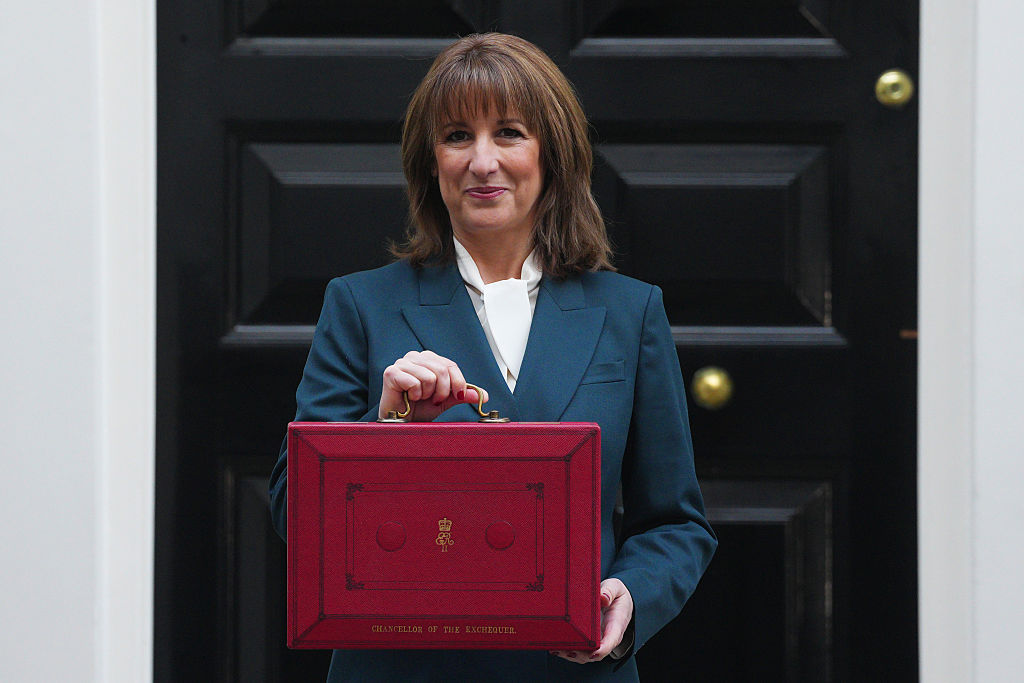What we have seen today is unprecedented. The entire list of Budget measures announced by Rachel Reeves – along with their costings and economic impacts – were leaked by the Office for Budget Responsibility (OBR) an hour before the Chancellor took to her feet. The OBR apologised and called it a ‘technical error’, but make no mistake: this is perhaps the biggest scandal in Britain’s Budget history.
Make no mistake: this is perhaps the biggest scandal in Britain’s Budget history
The headlines from the Budget are:
- Reeves will hike taxes by a total of £26 billion.
- Income tax thresholds will be frozen again, raising £8 billion and dragging nearly 800,000 more people into paying tax.
- The tax burden will hit a record high at 38 per cent of GDP.
- The minimum wage for adults will rise to £12.71.
- Real GDP is forecast to grow by 1.5 per cent on average over the forecast period, 0.3 per cent lower than expected – and a downgrade in every year of the forecast.
- Net migration is expected to fall until mid 2026, before rising again by 2030.
The surprise in the Budget was that the black hole, of which so much had been briefed, was far smaller than expected. Increased tax revenues and upgrades to wage growth offset what was still a large downgrade to productivity growth. The result: the knock to Reeves’s headroom was only £6 billion and her tax measures mean she has left herself with a much larger margin for error of £22 billion. Her hope will be that this number alone will reassure investors, shrink gilt yields, reducing the cost of borrowing and giving her even more headroom next time. However, the OBR still thinks this headroom is pretty small. They put her chance of meeting the rules at just 59 per cent.
On growth the forecasts for this year were upgraded from 1 to 1.5 per cent. The good news stopped there though with downgrades in every subsequent year of the forecast.
In more bad news, inflation was revised up. The OBR found: ‘Greater domestically generated inflation, alongside higher food prices, mean we also expect inflation to stay higher for longer than in March.’ Inflation this year, the OBR says, will be 3.5 per cent and then 2.5 per cent next year – some 0.2 and 0.4 percentage points higher than expected at the Spring Statement. The OBR’s verdict is clear: Reeves has made the cost of living worse. Price rises will not return to the Bank of England’s 2 per cent target until 2027 – a whole year later than had been forecast in March.
There were giveaways for those on welfare though with the measures announced in the Budget taking benefits spending up by £9.3 billion. That includes the U-turns on winter fuel and disability benefits cuts as well as the scrapping of the two-child benefit cap at a cost of £3 billion.
That will all be paid for by tax hikes on the rest of us. Her £26 billion tax raid will take the tax burden to an all-time high of over 38 per cent of GDP in 2030-31. Some £8 billion of that comes from freezing income tax thresholds for a further two years. That (combined with previous freezes) drags 5.2 million more people into paying income tax by the end of this parliament.
The rumours of a mansion tax were confirmed too, with a raid on houses valued at over £2 million. This, the OBR say, will bring in £400 million a year by the end of this decade. Reeves will also raise just under £5 billion by abolishing National Insurance relief on pension contributions above a £2,000 allowance. Dividends and savings will be squeezed too to raise another £2.1 billion.
Crucially though most of these tax rises don’t come in until the year before the election to pay for spending increases that kick in almost immediately. Markets could react badly to that if election year tax rises turn out to be a mere accountancy fiction.
The result of all that is a collapse in household savings and disposable income. Household savings will fall from 6 per cent this year to 2 per cent at the end of the decade. Meanwhile, Real household disposable income – our best measure of living standards – will grow at just 0.5 per cent per Briton over the forecast. That’s half of the 1 per cent a year they’d grown over the last ten years.
On borrowing, the OBR increased its forecast for how much we will have to ask from markets by over £69 billion compared with the spring. That pushes Britain’s national debt over £3 trillion for the first time – more than double what it was before the pandemic.
To avoid this mess again, Reeves also announced that the OBR will now score only one fiscal event a year: an Autumn Budget. This is something the International Monetary Fund had recommended.
But no one is going to remember a single measure announced/leaked today. Reeves’s second Budget will be remembered for one thing: its shambles. If the leaking, briefing, U-turning and kite flying hadn’t been enough, the OBR publishing the entire thing an hour before she spoke – and drastically moving markets as a result – will be pored over for months to come.
The Chancellor will hope that changes to the system, and the increased headroom she has left herself, will mean we never have to experience anything like this again. But the truth is she has done nothing to tackle the fundamental flaw at the heart of Britain’s economy: the staggering amount we spend. Until someone is brave enough to confront that issue, fiscal crisis will never be too far away.







Comments